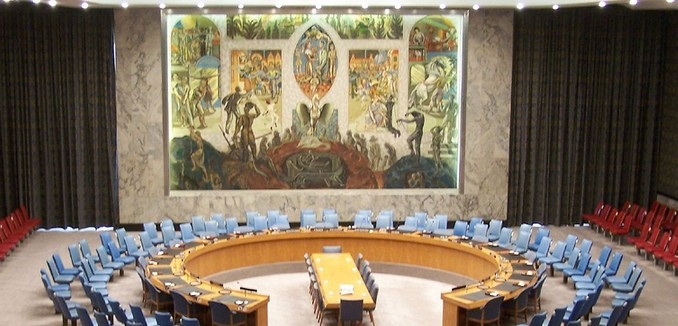Talks are underway between the seven countries negotiating over Iran’s nuclear program—including the five permanent members of United Nations Security Council—to lift the security council’s sanctions on Iran, Reuters reported today.
The talks between Britain, China, France, Russia and the United States — the five permanent members of the Security Council — plus Germany and Iran, are taking place ahead of difficult negotiations that resume next week over constricting Tehran’s nuclear ability.
U.S. Secretary of State John Kerry told Congress on Wednesday that an Iran nuclear deal would not be legally binding, meaning future presidents could decide not to implement it. That point was emphasized in an open letter by 47 Republican senators sent on Monday to Iran’s leaders asserting any deal could be discarded once President Barack Obama leaves office in January 2017
But a Security Council resolution on a nuclear deal with Iran could be legally binding, say Western diplomatic officials, complicating and possibly undercutting future attempts by Republicans in Washington to unravel an agreement.
According to an unidentified official, the talks to lift sanctions are ongoing, so if a nuclear agreement is reached with Iran, “we’ll want to move quickly on the U.N. sanctions issue.”
Sanctions were imposed on Iran after it pursued uranium enrichment in violation of its Nuclear Nonproliferation Treaty (NPT) obligations in 2006. Resolution 1696 was passed in July 2006 by a vote of 14-1 in the Security Council, with only Qatar dissenting, which “demanded that Iran suspend all enrichment-related and reprocessing activities, including research and development, and gave it one month to do so or face the possibility of economic and diplomatic sanctions to give effect to its decision.”
When Iran did not comply with the first resolution, Resolution 1737 was passed unanimously in December of that year, imposing sanctions “blocking the import or export of sensitive nuclear materiel and equipment and freezing the financial assets of persons or entities supporting its proliferation sensitive nuclear activities or the development of nuclear-weapon delivery systems.”
According to Reuters, while the lifting of sanctions is dependent on the conclusion of a nuclear deal, the reported deal would still allow Iran to maintain thousands of centrifuges enriching uranium, the same activity that triggered the sanctions in the first place. Lifting the Security Council sanctions while allowing Iran to enrich would seem to reward Iran for its illicit behavior, as well as gut the NPT treaty.
[Photo: Jessica Spengler / Flickr ]




